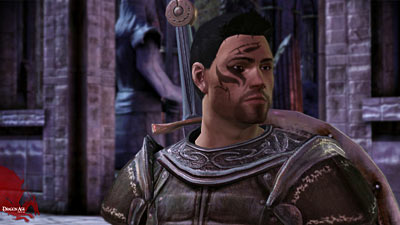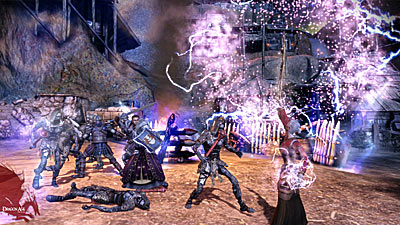Dragon Age: Origins Interview 
Game Facts: Systems: X360, PS3, PC | Publisher: Electronic Arts
Developer: BioWare | Release Date: Nov. 3, 2009 (PS3 – Nov. 17)
Interview with the designers and producers
of Dragon Age: Origins
by J. Matthew Zoss
October 8, 2009 – BioWare is a team known for massive games. From Neverwinter Nights to Mass Effect, BioWare has been building complex gaming worlds for years and stunning players with involving storylines and morally ambiguous characters. Dragon Age: Origins is one of BioWare’s biggest projects ever, and to get a glimpse behind the world of Dragon Age we sat down with some of the key players in its development: Executive Producer Mark Darrah, Lead Designer Mike Laidlaw, and BioWare’s famous doctors, Dr. Greg Zeschuk and Dr. Ray Muzyka. In this interview, we discuss the origins of the game, BioWare’s place within EA, and how the story’s appeal transcends video game genres.
MD: Mark Darrah – Executive Producer of Dragon Age: Origins
ML: Mike Laidlaw – Lead Designer of Dragon Age: Origins
RM: Ray Muzyka – Co-founder and CEO of BioWare Corp.
GZ: Greg Zeschuk – Co-founder and VP of BioWare Corp.
CCC: Cheat Code Central
Mark Darrah
MD: I’m Mark Darrah, Executive Producer of the Dragon Age franchise. What that means is that not only am I in charge of Dragon Age: Origins, but I’m also in charge of the other products in the franchise. At the moment, there is only one main game project, which is Dragon Age: Origins, but also I’m in charge of the novels and the pen and paper game. If we were to decide to do a Dragon Age MMO or something, that would also fall beneath my “powers.”
CCC: How did you find your way to your current position?
MD: I started at BioWare in 1997 as a programmer on Baldur’s Gate, and I moved into the lead programmer position on Tales of the Sword Coast and Baldur’s Gate II and Throne of Bhaal. I was also lead programmer on Jade Empire.
CCC: And then you moved over to Dragon Age?
MD: I was project director on Sonic Chronicles: The Dark Brotherhood on DS, and then I moved over to Dragon Age. I’ve been on the project for about a year now.

CCC: What have your duties been as Executive Producer?
MD: It’s been about making this game the best it can be. One of the things that’s really happened is that we’ve taken the time to make sure that we polish – making sure that the balance was there, making sure that areas felt living, that they had content beyond the critical path. When you go into an area, it’s not just “go into an area, kill the big dragon, and off you go.” There are other things going on, areas have a life of their own that you can explore aside from the critical path.
CCC: With so much content in one game, was there ever any conversation about narrowing its scope?
MD: What’s happened with Dragon Age: Origins is that we set out to make something, tell a story we wanted to tell, and we told it. I think its quality comes from the fact that we were unwilling to compromise, even over things like scope.
CCC: How many writers are working on this game?
MD: At the peak, I believe there were seven. The writing has been going on for a long time. The lead writer has been on the project from the beginning and he’s written a lot about the way the universe works and has written a lot of the story. One of the things that you need to do to tell a story of this size is that you need to make sure that there’s something behind the backdrop, that it’s not just a picture painted on a wall. As a result, there’s thousands of years of history written. There are a lot more stories to be told in this universe.

CCC: When you’re creating a universe such as this, how do you make sure that it feels fresh and original?
MD: What we’ve done is include those elements of traditional fantasy – you’ve got dwarves, you’ve got elves – but we’ve taken a fresh look at each and every thing. In the case of the elves, ours are living in ghettoes, or they’ve moved back into the forests, but they’re not really in touch with nature. They’ve lost that. They used to be this empire, but they were knocked down and enslaved by humanity for centuries, and they’re just regaining their freedom now. You look at them and say “that’s an elf,” but there are a lot of unusual differences. Dwarves are much more political, more insular, more caste-driven than in traditional fantasy. I think that grey area, that tonal difference makes it something fresh. But we didn’t go to something completely different so you don’t lose those touchstones of the traditional fantasy elements. There’s strength in being close but different, because you can play off those differences. When you have a preconceived notion and you twist it, it’s more impactful.
